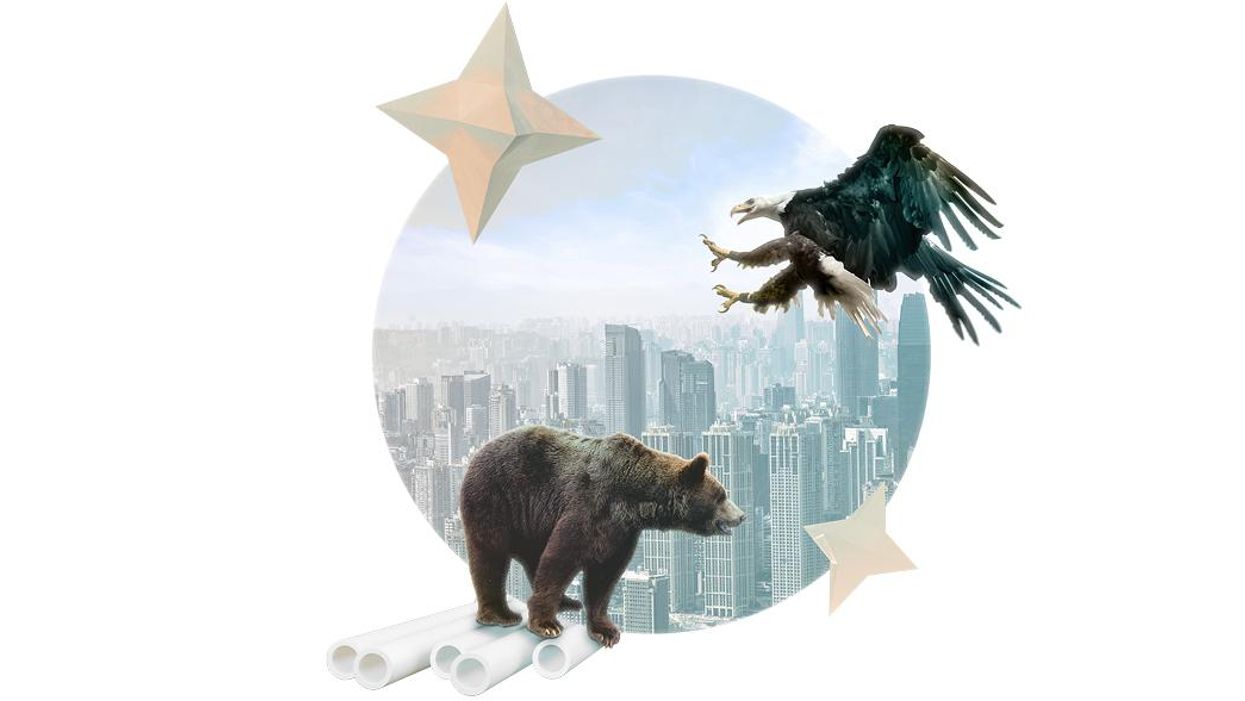
Episode 6: Economic weapons & fallout of the new Cold War
Listen: Today, the US/Russia relationship is at a new low as war rages in Ukraine, and a new Cold War is growing. But the old Iron Curtain existed to divide Europe. This one is uniting it, and further isolating Putin’s Russia. On the latest episode of Living Beyond Borders we’ll discuss what that means for America, the global economy, and your bottom line.
Transcript: Season 3, Episode 6: Economic weapons & fallout of the new Cold War
Disclosure: The opinions expressed by Eurasia Group analysts in this podcast episode are their own, and may differ from those of Citigroup Inc and its affiliates.
Ian Bremmer: The old iron curtain divided Europe, the new iron curtain unites Europe. What it means for the United States is not as clear.
Steven Wieting: Whatever stalemate, if that's the word that might arise from this, these are going to be more or less permanent changes. I don't think that the world is going to say, "Well, you know what? It's been a while, we can go back to the way it was."
Shari Friedman: Welcome to Living Beyond Borders, a podcast from Citi Private Bank and GZERO Media. On this program, we examine global risks and opportunities from the angles of both politics and economics. I'm Shari Friedman, managing director of climate and sustainability at Eurasia Group. Today, we're asking some big questions. Has Russia's invasion of Ukraine led to a new cold war? And what does that mean for the US, Europe and the world? In 1985, after four decades of standoff between the world's biggest superpowers, then US President Ronald Reagan had a private conversation with Soviet leader, Mikhail Gorbachev. Reagan asked him, "What would you do if the United States were suddenly attacked by someone from outer space? Would you help us?"
Gorbachev's response, "No doubt about it." That moment didn't magically end one of the greatest political power struggles in history, but it did start to melt the ice. Fast forward to 2009 in that same city, Geneva, another pair of leaders met. This time, US Secretary of State Hillary Clinton and Russian Foreign Minister Sergey Lavrov famously agreed to a relationship reset. Now in 2022, the hopes of that ever happening again seem rather low. And this is where our conversation begins. I'm joined by Steven Wieting, chief investment strategist and chief economist at Citi Global Wealth Investments, and Ian Bremmer, president of Eurasia Group and GZERO Media. Welcome to you both.
Steven Wieting: Thanks for having me.
Ian Bremmer: Thank you so much.
Shari Friedman: Ian, you shared that Reagan-Gorbachev anecdote at the start of your new book, The Power of Crisis. At a high level, how has the US-Russia relationship changed through the post-cold war era?
Ian Bremmer: Well, there was this view when the Soviet Union collapsed that we were in a new world order, a new liberal, free market, globalized order. And that not only was the EU going to expand, not only was NATO going to expand, but a Yeltsin-run, independent Russia and 14 other independent former Soviet republics were going to be a part of that global order. And the combination of very weak institutions in Russia, kleptocratic individuals that had access to the levers of power, and a lack of committed interest and willingness to fund a transition from the United States and the West led to a loss of those opportunities for the US-Russia relationship.
Ian Bremmer: Culminating back in 2000, not even a decade after the Soviet Union collapsed, in an article that was discussed, much lauded the whole year, by Robert Kaplan called, “Who Lost Russia?” And there were other opportunities for a reset between the two countries. And after the 9/11 attacks, Putin allowed the Americans and the coalition to use bases in Central Asia, but there was never an opportunity to really build a partnership. And of course, since then, leading up to the war in Ukraine, you no longer have a G7 plus one, the NATO-Russia joint council doesn't mean anything anymore. Functionally the US-Russia relationship had descended to one of hostility.
Shari Friedman: Do you think that this is a new Cold War today?
Ian Bremmer: I wish it was only a new Cold War, I think it's worse than that. I think we are in a new cold war with elements of hot war. It's a new Cold War in the sense that the Russian economy has been decoupled from that of the advanced industrial economies, the US and its allies, as a direct consequence of the Russian invasion on February 24th. And that, as a consequence, there really is very little engagement, either diplomatic, economic, or cultural between the West and Russia today. And I think that is functionally as permanent as at least the Putin-led Russian regime is and perhaps well beyond that.
But there are also elements of hot war, the cyber attacks on critical infrastructure that the Russians backed away from a year ago after Putin and Biden met in Switzerland are likely to restart. The espionage, the disinformation attacks. And we're also starting to see a fair amount of nuclear posturing, at least by the Russians towards the United States and NATO while NATO itself expands with forward deployments on the Russian border. So, if it were only a Cold War, I think we would take that as good news. The true danger is that it's not just that.
Shari Friedman: Steven, what does this mean economically? Not just for the US and Russia, but globally. The world is a very different place today than it was in 1945 or in 1989.
Steven Wieting: Russia's economy has never become massively significant from a domestic demand point. It wasn't China, for example, after the dissolution of the Soviet Union. But its importance to global commodity markets has risen to a very high level. It was exporting about 9% of all the crude oil consumed around the world. And that is maybe one of the smaller effects. I think in this particular episode, you have to think about Russian and Ukraine both and for commodities like food and particular types of grains, demand variability is very low, demand elasticity is extremely low and they were providing together a much larger share than that 9%. Probably double that in terms of global consumables. So it's meant a very painful price effects, particularly for the emerging world where that it's a larger share of budgets, where less processed food is more important. And then there's the effects way beyond, it's not just crude oil, natural gas for Western Europe, for Germany, that's vulnerable at particular seasonal times of the year, but fertilizers, rare earths, et cetera.
So again, for many economies it may be pennies on the dollar, but these are potentially acute shortages. It's required a redirection of global trade flows, more to China, potentially India and Russia. And that's one of the ways that absolute prices are not spiking quite as much. Those other consumers can buy at a lower price and buy less from others. And this is how it gets contained somewhat. But if not for that, this would be a tremendous supply shock, at least along the lines of some of the worst in history. Thinking back to 1974 example for the OPEC embargo as a type of effect on the economy in that way.
Shari Friedman: And Ian you've described this new iron curtain figuratively as an economic one. Companies stop doing business and travel and people exchanges are restricted. So moving over to the impact then on the countries, Ian, how does this hurt Russia? And what does this mean for the US and for Europe?
Ian Bremmer: Well, maybe I could say something really obvious about what it means for Europe to begin with, which is that the old iron curtain divided Europe, the new iron curtain unites Europe. The only thing behind the new iron curtain is Russia, some occupied Ukraine and Belarus. And that's it. So the Europeans are now going to be more unified, the EU will be more politically cohesive. They recognize the importance of having stronger spend on defense and a stronger European defense capability that can partner more effectively with NATO. It means that the Europeans together must diversify away from Russia, particularly in terms of their energy dependence, and virtually all of them are doing that as fast as possible. The limited number of exceptions, Hungary and a few of the East Europeans are what's most notable not the fact that the Europeans are divided in any way.
They really aren't on this. So, that's one thing. There's an enormous economic cost for Europe, but it's very cohesive. We have a stronger EU, a stronger transatlantic relationship, a stronger NATO, and an expanded NATO on the back of this Russian invasion. What it means for the United States is not as clear. This is not as important to the Americans. You don't have millions of Ukrainian refugees streaming into the United States. You don't have the same level of economic dependence of the United States on Russia, the way the Europeans had. So you don't have the same level of sacrifice, though clearly the impact on inflation is very significant. The broader question is how it hurts Russia. And by the way, you didn't ask how it hurts Ukraine, but that matters too. We're expected to see a contraction of the Russian economy by 10 to 15% this year.
But if I'm right and the decoupling is functionally permanent, the freezing of their assets, the end of Western multinational investment, the lack of the diversification of energy, all of those things. That means that Russia's contraction of its economy is going to go on for years. The way we saw with Iran, which had similar levels of sanctions against it. And within a decade, it was a 50 to 60% contraction. And yes, Russia will still be selling raw commodities to other countries around the world, the developing world, for example, in terms of oil and fertilizer and food. But manufactured goods and goods that require semiconductors, for example. Russia has been the second largest arms exporter to the world after the United States, very important for their hard income. And there's no way that they're going to be able to do that going forward. They won't have spare parts.
They won't be able to manufacture the way they used to. They're being cut off from these supply chains. So, this is an enormous hardship on the Russians for the medium to long term. And by the way, it is for Ukraine as well. The IMF expects that Ukraine's economy will contract by some 45 to 50% this year. They are a warzone that they are continuing to fight. They are losing large pieces of their agriculturally productive territory. They have no access to their major port of Odessa. They own it, but they can't export from it. They've had to mine it and the Russians are block hating it. And again, I don't see that going away anytime soon either. So they can get international aid, and when the Americans are no longer spending, they'll kick it down to the multilaterals like the IMF, the EBRD and the World Bank. But medium term, this is also going to mean a collapse of the Ukrainian economy. Nothing good coming out of this I hate to say,
Shari Friedman: Steven, building on what Ian is saying about these timelines and the fact that some of the impacts on the Russian economy and this decoupling is going to be long-term. These sanctions are very intense, they're the most intense that we've seen against a G20 nation. Do you believe that these are sustainable for the global economy?
Steven Wieting: I think that there's essentially no choice, and we should not be under the assumption that there'll be some peace breakout, that there'll be some settlement and suddenly Russia will rejoin and recouple with Western economies. Technically, I suppose it's possible under a regime change. But whatever stalemate, if that's the word that might arise from this, these are going to be more or less permanent changes. And it creates new trading zones in other currencies. Certainly some of the technology that would've come directly from the West might instead come from other sources and it won't be the same technology, but it'll be another source dividing the world into separate spheres. There are other things that may actually change in time. Things like tariffs on China, et cetera, that may be up for grabs. But I don't think that the world is going to say, "Well, you know what? It's been a while, we can go back to the way it was."
Shari Friedman: Ian, it sounds like both you and Steven are saying the same thing about this very long-term shift and decoupling from the US and Europe from Russia. And they have financial and trade ties to non-aligned nations like India, Brazil, South Africa. How does that impact the picture that's emerging here? And is it enough to mitigate the damage to Russia's economy?
Ian Bremmer: Well, the United States does not have the world's democracies on its side here. It has the world's advanced industrial democracies, the rich countries. And that is, of course, a real issue. The developing world largely sees its interests as hanging together. They are the ones that are worried about an America-first foreign policy or a US foreign policy for the American middle class. They don't like terms like ensuring and friend-suring. And when they hear Biden talk about democracies versus autocracies, they think, well, that only works when it's expedient for the Americans but not more broadly. Certainly the developing countries of the world didn't feel that way when vaccines were being handed out and they didn't feel that way when the Russia war with Ukraine started and suddenly commodity prices spiked through the roof. So, I do believe that these countries are going to continue to buy from the Russians, especially if they can get a discount for the commodities that they need for their own populations.
But that's very different from saying that's going to work in terms of keeping the Russian economy afloat. The fact is that as the Europeans engage in boycotts in oil, they're also talking about shipping boycott, shipping services, shipping insurance, shipping reinsurance. Well, the Europeans provide 90% of that shipping of Russian commodities. That means it's literally going to be hard to create any spare capacity if the Europeans can't do it. And if you do create that spare capacity, it's coming from other countries like Iran or Venezuela so the Russians are competing for. In other words, that's not an answer to higher commodity prices, and that's not an answer long-term for the Russians being able to keep their economy going. That on top of the manufactured goods, the lack of FDI and, of course, the freezing of Russia's Central Bank assets that were being held externally in these advanced industrial economies.
As Steven and I agree, none of that is going to get unwound because we don't see a plausible political outcome where the Russians are going to be willing to do enough that you could have a breakthrough in negotiations. Look, right now, the Russians are not only occupying a great deal more of Ukrainian territory than they had prior to February 24th. They are preparing to annex it in addition to the thousands of war crimes that have been committed by Russia against the Ukrainian civilians and the hundreds of thousands of Ukrainians that have been forcibly exported to Russian filtration camps and are still there. If you take that as your baseline, you cannot unwind these sanctions. And the reality that the United States, the most powerful economy in the world with the global reserve currency and the most powerful banking system in the world, and all of its wealthy allies are prepared to hang together on those issues means the developing countries will not be able to engage in business as usual over the long term with Russia.
Shari Friedman: Steven, I want to take this down to more of an individual consumer level. What does sanctions really mean for individual consumers? We're all experiencing high gas prices right now, how much of this is due to Russian sanctions and why?
Steven Wieting: Well, I guess it depends on which consumers, US consumers or German consumers over the course of the next winter. It could be very different. The effect on certain commodities is global, others are more regional. Gas, again, is a very regional commodity. LNG is providing a tiny share of what is needed to make it a more global commodity. It's very small, but hopefully a strongly growing part of how we could absorb these particular regional shocks. Crude oil would be a lot higher because of some of the things that have happened. Crude oil commodities generally boom and bust, and now they're booming. I would say that what was just a cyclical recovery from the lows of 2020, where there were large output declines, again has been made into something much bigger and more lasting because of what's happening in Russia-Ukraine.
There's sometimes differences here between whether we're permanently destroying capacity or we're interrupting the ability to deliver it. But just to go to your original question, the numbers that we are seeing, again, this extension of headline inflation. This shock on top of a supply disruption and all of the massive distortions to the American economy that were related to COVID, it just basically extended and worsened an existing problem. A lot of people are having difficulty figuring out where to place the blame. If you take a look at inflation in the year to date, it's risen twice as fast as wages. This is not a wage price spiral. This is the afterglow of last year's boom, which included stimulus into the early part of the year. But real instability in the sources of supply and demand in the world, massive changes that were related to COVID.
It's not usual for consumers to say, "Well, let's take an extra 50% out of our budgets to buy cars and trucks and not take public transportation." That's the kind of distortion you got around COVID. But then this happens in February, and what has been a really significant spike up in oil has broadened out to many commodities. I think if you look at certain agricultural commodities, metals, oil and gas regionally, futures curves have pushed out and up about 25% since where we were prior to the invasion of Ukraine. Now, they look to be coming down over the future just as they did before. High prices, again, incentivize production, but we're looking around the world again for new supplies in the West, for things that were provided by Russia and Ukraine. There are some price gaps, and it might be a little bit different for a Chinese consumer that is getting some of these imports. But no doubt the headline inflation rate in the United States is a couple percentage points higher, at least for perhaps the remainder of the year, simply because of this terrible crisis.
Shari Friedman: Ian, Steven has just noted that what we're seeing right now is built up upon an already shaky economic foundation. And I'm wondering if you could unpack the economic impacts that we're seeing right now. How much of this is due to the sanctions themselves? And how much do you think is due to the impact of war or some of Russia's behavior? Where are we seeing this inflation coming from, particularly in food and in fuel?
Ian Bremmer: Some of it predates the war. Some of it comes from this extraordinary whiplash of shutting down global economies and then opening up global economies with COVID, in a V-shaped fashion that really impacted supply chains that were just in time and global all over the world. That leads to inflation when you have that level of demand and that level of fiscal stimulus across economies everywhere. So, not only are you suddenly opening demand, but you have a lot of pent up money that's prepared to actually spend. That's going to lead to a lot of inflation. That's where we were. That's why Larry Summers was criticizing Janet Yellen and others, and saying, "We're going to have a lot more inflation." Biden administration was saying, "No, we're not." So wasn't just about the United States. You've seen it in Europe, you've seen it all over the world. Then the war hits. And yes, the sanctions matter a lot for the inflation that we've seen. But so too the fact that a lot of Ukraine's agricultural infrastructure, it's seed storage, its ability to move ag to ports, its ability to export.
None of that is functioning right now. The fact is that you have a Black Sea that has been mined heavily by the Ukrainians so that the Russians will not be able to succeed in an amphibious landing to take the remaining coastline of Ukraine on the Black Sea. Well, you can't very well get your goods out of port in that environment. Now, there's also sanctions on Belarus, which is a land transit between Ukraine and the rest of the world for commodities. But the Belarusians have been fully mobilized and supporting Russia in the war against Ukraine. They are not only sanctioned, but the Ukrainians are not prepared to ship goods out through Belarus, which is fully aligned with Russia. So, I think that when you're talking about the price impact of all of this over the last year, it is a much more complicated story than just saying it's because of the sanctions. The sanctions are because of the invasion and the price increases are not only because of the sanctions, because of the invasion, they're also because of other acts that are being taken.
Shari Friedman: Very complicated situation. So Russia is nowhere near the economic player that China is and I'm wondering how the war is affecting the already fraught relationship between the US and China?
Ian Bremmer: Finally, something I have some good news on. It's not actually affecting the relationship between the US and China very much indeed. The headlines on the US-China relationship right now are that Present Biden directly is interested in reducing or removing some of the Trump era tariffs that were placed on the Chinese and hoping for reciprocity. And there have been some high level private conversations between the two governments in the last few days, specifically on that. You would not be discussing that with the Chinese if you viewed the Chinese through the same lens as you view Vladimir Putin and the Russian government.
The Chinese government did of course say, back on February 4th, that they were friends without global limits with Vladimir Putin and Russia. That was an unprecedented historical thing for Xi Jinping to say. But the fact is that the Russian economy is one 10th size of the Chinese economy. They hadn't anticipated a full on invasion that would go this badly and last this long, even if they thought some form of military intervention was possible or likely. And they haven't done anything to try to break American sanctions against Russia or provide military support to the Russians. And as a consequence of all of that, the US-China relationship, despite the Russian invasion into Ukraine, has actually remained quite stable.
Steven Wieting: Really good news what Ian just described. Again, avoiding any counter measures on sanctions, putting us in a position to deal with China very realistically at what is a much more important trade relationship, a much more important economy to the world. I think, again, we've been in a situation for several years, for different reasons of disintegration of these economies. There is certainly a great deal of disagreement, distrust. There are very material disagreements, but thankfully this conflict I think has certainly shown again some of the power that financial sanctions that Western economies can really exhibit, that they can certainly bring economies together. Again, the tragic loss of human life is not something that can be looked past entirely. And we see a terrible, very strong effects on Russia's economy. And this is something that the world could actually bring a little bit of order to the world. Now, again, that's geopolitics, but if I just, again, focus on this trade relationship, it's not getting worse. And hopefully again, there is some opportunity again for two economies that have had-
The US and China at various times have had synergistic economies. And to say that that is entirely, again, over with, all this is another cold war. Again, it would be great news if that can be avoided. And I would say, certainly it has not gotten worse, just as Ian noted.
Shari Friedman: Ian, you've pointed to a silver lining about having NATO be strengthened and cooperation among transatlantic democracies in general. Do you see that lasting beyond this moment of crisis? And where do you see the potential problem areas that might arise in these relationships?
Ian Bremmer: It's very clear that the Europeans are going to continue spending on defense in a dramatically greater way. Frankly, the Japanese are now committed to spending more in defense as a result of NATO getting stronger, NATO expanding. And the Japanese are being invited to the Madrid summit coming up at the end of this month. So, there are knock on effects for an organization that was considered brain dead by the French President Macron, considered obsolete by the American President Trump. That now actually has an immediate purpose that really requires a level of vigilance and prioritization. Now, that's permanent. This is generational stuff. The Europeans have millions of Ukrainians living in their homes. And many of them believe that the Ukrainians are fighting for them, fighting so that the Poles and the Baltic states and others don't have to. And that will affect the way they think about Europe and the way they think about the planet going forward. For literally tens of millions of Europeans. This will be the most important geopolitical incident of their lifetimes. It will affect them the way 9/11 has affected Americans, and to a much greater degree in my view.
Ian Bremmer: Maybe I should say, affected New Yorkers or Washingtonians. So, that is meaningful. But you notice I'm talking about Europe, I'm not talking about the United States. And I think one of the big questions out there is how committed the Americans will be through a very divisive midterm election, with the possibility of Trump coming back, likelihood of him being the Republican nominee. And close to a coin flip that he will return as president of the United States, with a very different view of American unilateralism, a lack of interest in supporting a European Union. In fact, the biggest difference between Biden and Trump in foreign policy is that Biden's quite committed to the strength of the EU as a support of the United States worldview, where Trump actually supported Brexit. Trump supported Orban, who is the major leader in Europe that's actually most aligned with Putin. So, I do think that the question of American consistency and commitment in leadership, especially on these issues, is a much bigger open question than anything we would see from the Europeans going forward.
Shari Friedman: So Steven, this is going to create a lot of uncertainty, not just for global economies, but also for investors. What should people be taking away from this conversation in terms of their next steps in the market?
Steven Wieting: Well, look as investors, we have an unfortunate situation, a tragic situation, but does require us to allocate capital differently. It is a sad situation, again, what has happened to Ukraine's economy, but it's absolutely critical for humanity that we have greater food security. That means investment in products, again, to replace that lost output, and we better do that at least over the short term. Then there's the issue of defense spending. This is no one's ideal use of capital. We could do much better things for human capital in a more ideal world, but a defense deterrent against Putin seems like one of the best investments, again, for a better, more peaceful future than where we would be otherwise. So, these are things that we wish we didn't have to include as portfolio investments, but we're not in an ideal world, so we will.
Shari Friedman: Ian Bremmer, president of Eurasia Group and GZERO Media and Steven Wieting, chief investment strategist and chief economist at Citi Global Wealth Investments. Thanks to you both for joining today.
Ian Bremmer: Happy to be here.
Steven Wieting: Thank you so much.
Shari Friedman: That's it for this episode of Living Beyond Borders, stay tuned for more throughout the summer. We'll talk about ongoing supply chain disruptions, continue to follow the US-China relationship and examine the impact of women on the global economy. To listen to previous episodes, head to gzeromedia.com and click on the Living Beyond Borders tab, or subscribe wherever you get your podcasts. For GZERO Media I'm Shari Friedman. Thanks for listening.
















